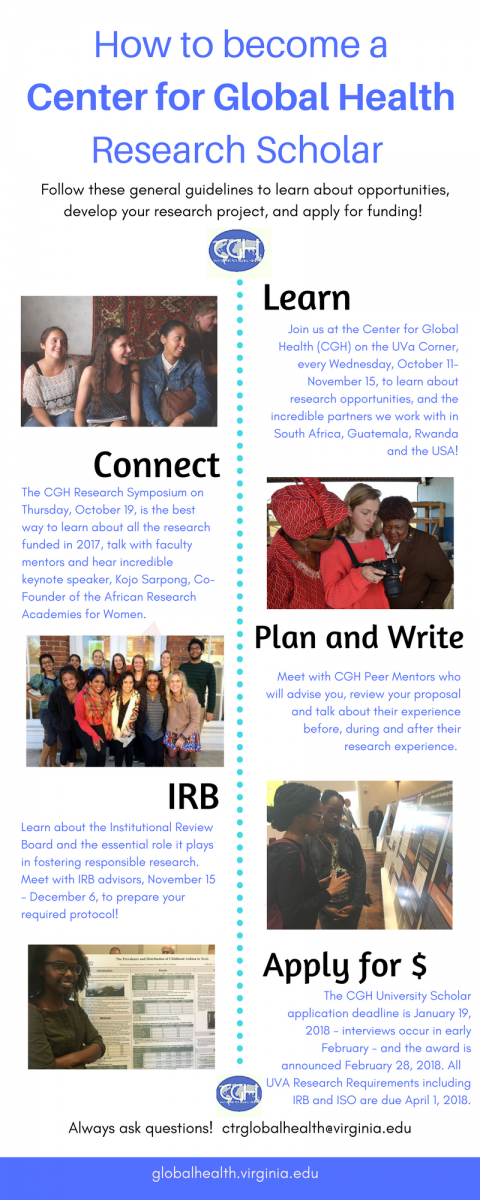
Global Partners and Global Health Research Projects
Site: GUATEMALA
Faculty Leader: David R. Burt, MD, Director, UVa-Guatemala Initiative; Faculty, Department of Emergency Medicine
UVA-GI Research Focus areas include:
- Potable water and Sustainable technologies (Healthy communities) Initiative (San Lucas)
- Women’s Reproductive Health in the South Lake Atitlán Basin (SLAB)
- Cardiovascular Disease (CVD) community-based education and research (Santiago, Atitlán)
- Data, Communications, and Technology in limited-resource environments
- Emergency Medicine and Trauma: systems development , capacity building and provider education (Totonicipan)
- Global Health at Home activities (Charlottesville)
- Electronic Medical Record (EMR) development, informatics, data utilization in Health (Proyecto SABER)
- Language, Linguistics, Communication and Research programs
Site: RWANDA
Faculty Leader: Marcel Durieux, MD, Department of Anesthesiology
Rate of infections in intensive care units (ICU) of referral hospitals in Rwanda
Study staff: Mvukiyehe Jean Paul, MD, Anesthesia Resident; 2 UVA students
Location: University Hospital Kigali
The aims of the study will be to determine the prevalence of infections in ICU patients and the related mortality; to determine the most common microbial agents, and medication utilized with regard to their sensitivity and resistance; to determine the length of stay and days on mechanical ventilator; and to attempt to understand the risk factors associated with infections in ICU
Pregnancy with Cardiac disease in Rwanda
Study staff: Mvukiyehe Jean Paul, MD, Anesthesia Resident; 2 UVA students
Location: University Hospital Kigali
The aims of the study will be to determine the prevalence of the most common cardiac diseases in pregnancy, evaluate the portion of rheumatic heart disease in pregnant patients; to evaluate the associated maternal-fetal outcomes; and to propose possible solutions to improve outcomes
Postoperative pain management
Study staff: TBA; 2 UVA students
Location: University Hospital Kigali
The aims of this study will be to evaluate if patients were prepared for the pain they would have after surgery, which drugs were given intraoperatively, and whether after surgery patients were assessed for pain and treated according to protocols. Part of this study will involve prospective data collection in patients coming for surgery, and it is therefore particularly suited to medical students.
Site: SOUTH AFRICA
Faculty Leader: Professor Karen Ingersoll, Psychiatry and Neurobehavioral Sciences
Bi-lateral research on alcohol-related sexual risk: While U.S. data on how alcohol contributes to health risks and to the risk of sexual assault, unwanted sex, unintended pregnancy, intimate partner violence, and other social risks have been compiled for years, the problems are more complex than the headlines convey. To begin understanding and characterizing alcohol-related sexual risk, students will learn to conduct individual and focus group interviews.
Professor Liz Rogawski, Public Health Sciences
Dr. Rogawski leads research on the effectiveness of low-cost point-of-use water treatment technologies to prevent stunting among children in Limpopo, South Africa. Students will be working on an ongoing community-based randomized controlled trial in the Dzimauli community, about 45 min outside Thohoyandou, South Africa. The study is designed to test the effectiveness of two point-of-use water treatment technologies to improve clean drinking water access, reduce enteropathogen burden, and improve child growth among children in Limpopo, South Africa. Students will work closely with local fieldworkers to collect water samples and support other activities in the field. They will also partner with UNIVEN students to work in the lab at UNIVEN to test water and stool samples collected during the study for fecal coliforms and 8 common enteropathogens that have been associated with poor developmental outcomes. Because it is operationalized by a local study coordinator, data entry personnel, and more than 10 local fieldworkers, this study provides a unique opportunity for summer students to be involved in a larger project and learn from many different people about how international field studies are conducted.
Site: Nicaragua
Faculty Leader: Professor Emma Mitchell, School of Nursing, leads the collaboration in Nicaragua. The University of Virginia has had a longstanding relationship with two Universities and several organizations in Bluefields, Nicaragua. Through sustained engagement, partners have identified key areas for collaborative research. Foci for 2018 include: maternal/child health; disaster preparedness; and social entrepreneurship in the context of environmental health promotion. We are seeking students interested in joining inter-professional teams aiming to use an assets based approach to assessment of topic areas, partnered implementation of project ideas, and sustained evaluation.
Site: Dominican Republic
Faculty Leaders: Professors Paige Hornsby and Aaron Pannone, Department of Public Health Science
In collaboration with colleagues at the Universidad Iberoamericana (UNIBE) in Santo Domingo, Professors Paige Hornsby and Aaron Pannone lead research in the Dominican Republic on topics that include:
- Diabetes
- Maternal mortality
- Adolescent pregnancy
- Motor vehicle injury
Additional Opportunties:
SOUTH DAKOTA: 2017 CGH Scholar, Megan Eisenfelder, and Faculty Mentor, Howard Epstein (Environmental Sciences) This is a unique project that combines environmental sciences research, educational exchange, and community health within the context of a rangeland ecology, bison grazing experiment on the Lake Traverse Reservation of the Sisseton-Wahpeton Oyate tribe in northeastern South Dakota. For the science research, we will be analyzing the comparative effects of bison vs. cattle grazing on Native American rangelands, with regard to 1) the sustainability of the vegetation, soils, and animals, 2) the abundance and productivity of traditional medicinal plants, and 3) the economic viability of the animal production. This research project provides the context for educational exchange between UVA students and tribe members, with particular foci on 1) generating science education opportunities for tribal youth that may extend way beyond the current capacity of their educational system, 2) involving UVA students in the research, collaborations, and interactions with tribal community members.
